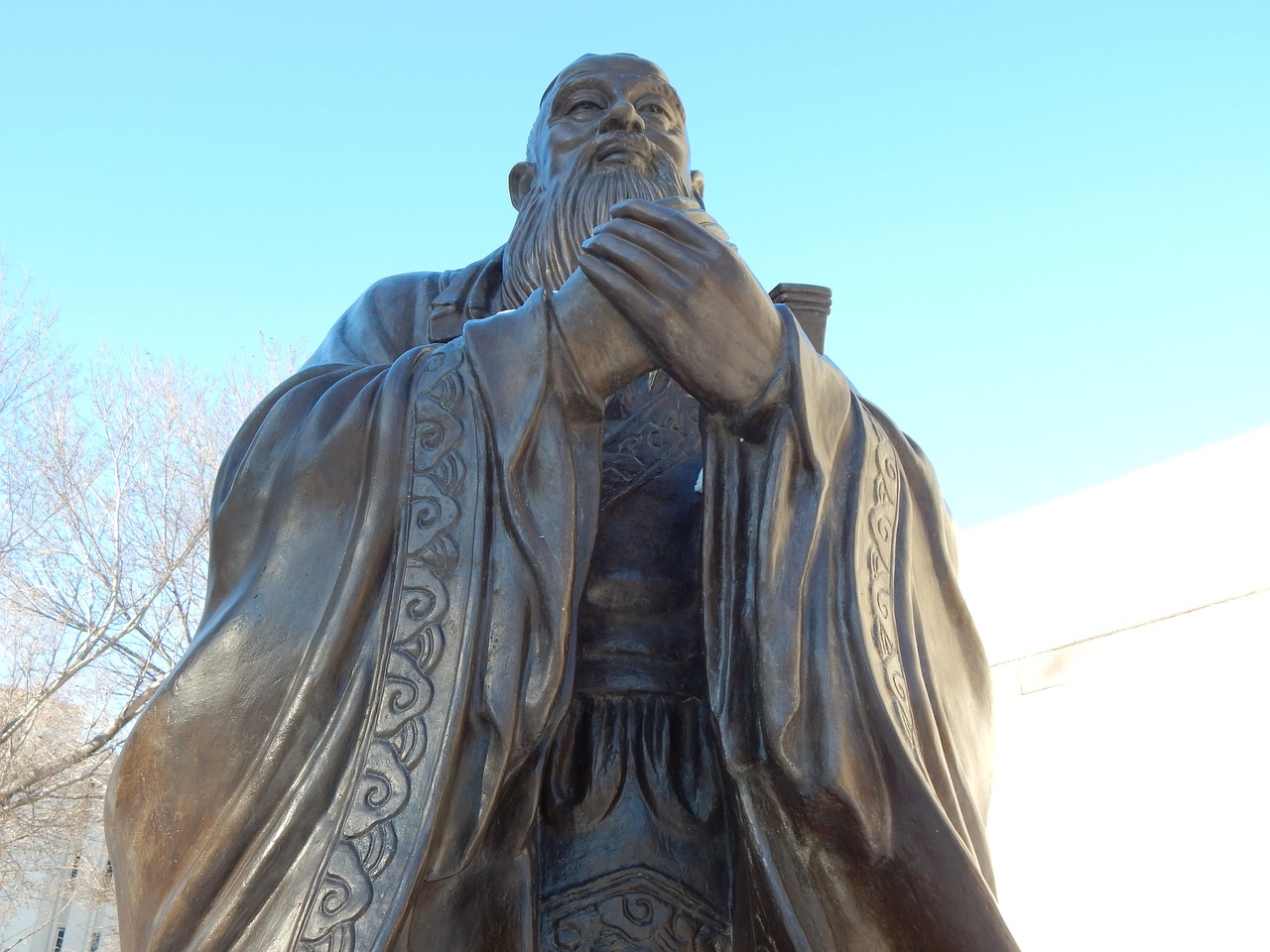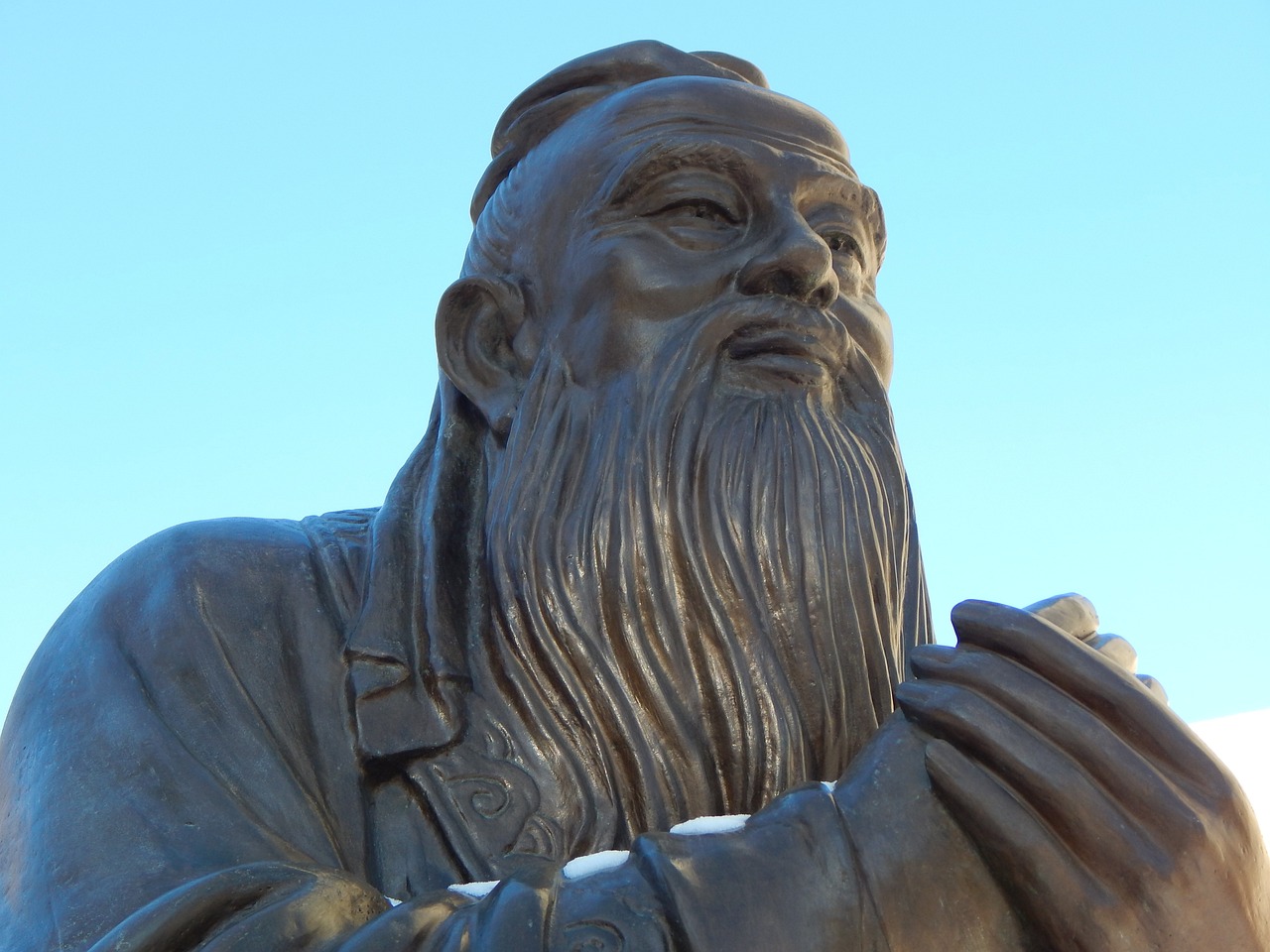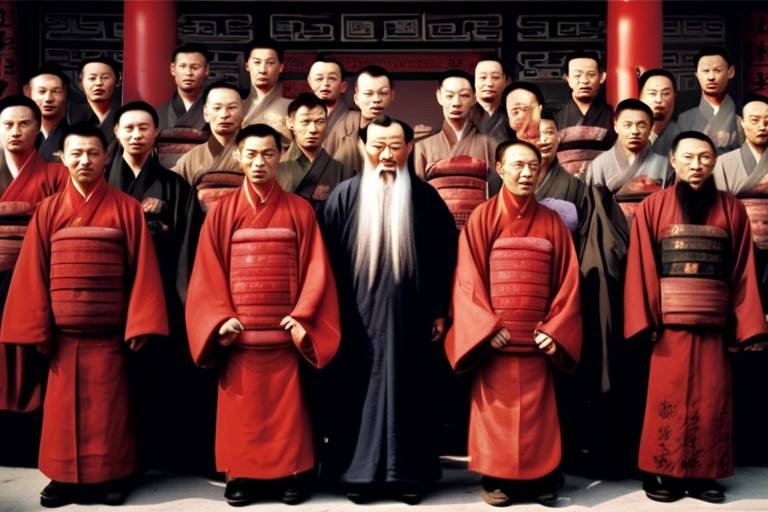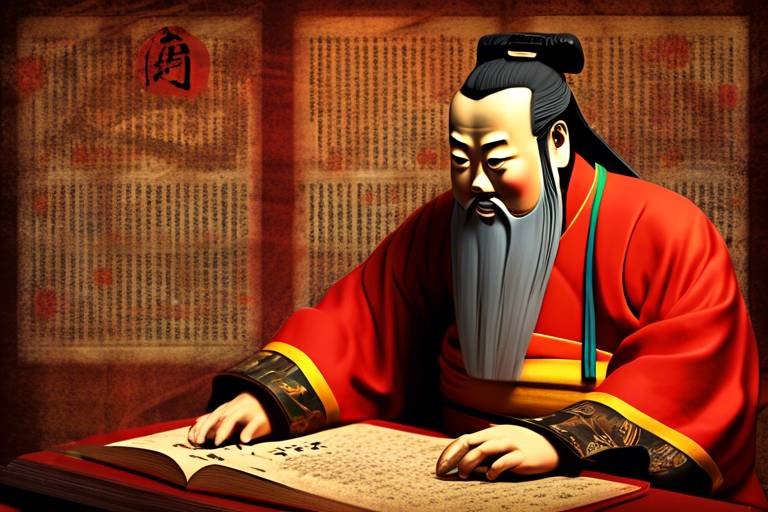The Influence of Confucianism on Chinese Culture and Society
Confucianism, a philosophical system founded by the ancient Chinese thinker Confucius, has profoundly shaped the cultural and social landscape of China for over two millennia. Its principles permeate various facets of Chinese life, influencing everything from ethics and family values to education and governance. This article delves into the intricate ways in which Confucianism has molded the identity of the Chinese people, creating a rich tapestry of beliefs and practices that continue to resonate today.
At its core, Confucianism emphasizes the importance of moral integrity, social harmony, and respect for tradition. These values have fostered a sense of community and belonging among the Chinese populace, making Confucianism not just a philosophical doctrine but a way of life. Imagine a vast network of interconnected relationships, where every person plays a vital role in maintaining the balance and harmony of society. This analogy captures the essence of Confucian thought, which sees individuals as integral parts of a larger whole.
Throughout history, Confucianism has served as a guiding light for ethical behavior and social conduct. Its teachings have been embedded in the fabric of Chinese culture, influencing everything from familial relationships to state governance. For instance, the concept of Ren (benevolence) encourages individuals to act with compassion and empathy, while Li (ritual propriety) outlines the norms and rituals that govern social interactions. Together, these principles create a framework that promotes not only personal morality but also societal stability.
Moreover, the influence of Confucianism extends beyond individual behavior; it has shaped the very institutions that underpin Chinese society. Educational systems, for example, have long been infused with Confucian ideals, emphasizing the pursuit of knowledge and moral character as pathways to personal and societal advancement. This focus on education has fostered a culture that values learning and intellectual achievement, ensuring that the teachings of Confucius remain relevant across generations.
In the realm of governance, Confucianism advocates for moral leadership, where rulers are expected to be ethical exemplars. This principle has significantly influenced Chinese political philosophy, promoting the idea that a government's legitimacy stems from the virtue of its leaders. Consequently, Confucianism has played a crucial role in shaping administrative practices throughout China's dynastic history, emphasizing the importance of benevolence and moral integrity in governance.
As we navigate the complexities of modern Chinese society, the enduring legacy of Confucianism is evident in contemporary social norms, business practices, and government policies. The values instilled by Confucian thought continue to resonate, reminding us of the profound impact this ancient philosophy has had on shaping the nation’s identity. As we explore these themes further, it becomes clear that Confucianism is not merely a relic of the past but a living tradition that informs the present and guides the future.
- What is Confucianism? Confucianism is a philosophical system based on the teachings of Confucius, emphasizing moral integrity, social harmony, and respect for tradition.
- How does Confucianism influence family values? Confucianism promotes filial piety, which underscores the importance of respect and duty towards one's parents and ancestors, shaping family dynamics in China.
- What role does education play in Confucianism? Education is highly valued in Confucianism as a means of moral development and social mobility, fostering a culture that prioritizes learning.
- How has Confucianism impacted governance in China? Confucianism advocates for moral leadership, where rulers are expected to serve as ethical exemplars, influencing political philosophy and administrative practices.

Historical Context of Confucianism
To truly appreciate the profound influence of Confucianism on Chinese culture and society, it's crucial to delve into its historical context. Confucianism, founded by the philosopher Confucius (Kong Fuzi) during the Spring and Autumn period (approximately 771 to 476 BCE), was born out of a time of political turmoil and social unrest. This era was marked by the fragmentation of the Zhou Dynasty, leading to a chaotic landscape where traditional values were being challenged. Confucius sought to restore social harmony and moral integrity through a return to the values of the past, advocating for a system of ethics that emphasized respect, familial bonds, and social responsibility.
As Confucianism evolved, it became more than just a philosophy; it transformed into a comprehensive social system that shaped the very fabric of Chinese identity. By the time of the Han Dynasty (206 BCE – 220 CE), Confucianism had been adopted as the official ideology of the state. This shift marked a significant turning point, as the teachings of Confucius were integrated into the governance and educational systems, laying the groundwork for a society that valued moral leadership and ethical conduct.
The impact of Confucianism continued to grow throughout various dynasties, influencing not only governance but also family structures and educational practices. The Song Dynasty (960–1279 CE), for instance, saw a revival of Confucian thought, which led to the development of Neo-Confucianism. This philosophical movement sought to reinterpret Confucian principles in light of Buddhist and Daoist ideas, further enriching the tradition and expanding its reach. The teachings were disseminated through literature and education, affecting the lives of scholars and common citizens alike.
Throughout history, Confucianism has faced challenges, especially during the May Fourth Movement in the early 20th century, when intellectuals criticized traditional values in favor of modernity and scientific thought. However, despite these challenges, Confucian ideals have persisted, adapting to the changing social landscape while maintaining their core tenets. Today, as China navigates the complexities of modernization and globalization, Confucianism remains a vital part of its cultural identity, influencing everything from interpersonal relationships to governmental policies.
In summary, the historical context of Confucianism is not merely a backdrop but a dynamic narrative that illustrates how a set of ideas can shape a civilization over centuries. Its ability to adapt and resonate with the Chinese people reflects a deep-rooted connection to ethical values and social harmony that continues to influence contemporary society.

Core Principles of Confucianism
Confucianism, a philosophy that has shaped Chinese culture for centuries, is built upon several core principles that serve as the backbone of its teachings. Among these principles, Ren (benevolence) and Li (ritual propriety) stand out as fundamental concepts that guide ethical behavior and social interactions. Understanding these principles is crucial to appreciating how they influence individual conduct and societal norms in China.
The principle of Ren embodies the spirit of compassion and empathy. It is not just about being kind; it's about fostering a deep sense of connection and understanding among individuals. Imagine a community where everyone acts with kindness and considers the feelings of others—this is the essence of Ren. In practice, this principle encourages people to engage in acts of kindness, whether it's helping a neighbor in need or showing compassion to strangers. It creates a ripple effect, inspiring others to act benevolently as well.
On the other hand, Li refers to the rituals, norms, and etiquette that govern social interactions. Think of Li as the glue that holds society together; it establishes a framework for respectful behavior, ensuring that individuals interact harmoniously. This principle emphasizes the importance of context in relationships, whether it be familial, social, or professional. For instance, in a formal setting, adhering to Li would mean following specific protocols, such as bowing or addressing someone with proper titles, which reflects respect and acknowledgment of social hierarchy.
| Principle | Definition | Impact on Society |
|---|---|---|
| Ren | Benevolence, compassion, and empathy towards others. | Encourages kindness and strengthens community bonds. |
| Li | Ritual propriety; the norms governing social behavior. | Maintains order and respect within society. |
When these principles are combined, they create a harmonious balance that guides interpersonal relationships and societal interactions. In fact, the influence of Ren and Li extends beyond personal conduct; they are deeply embedded in the fabric of Chinese culture, affecting everything from family dynamics to business practices. For example, in a typical Chinese family, children are taught to respect their elders and to practice Ren by caring for their parents and grandparents. This practice not only reflects filial piety but also reinforces the importance of community and social responsibility.
Furthermore, the emphasis on education in Confucianism serves as a vehicle for instilling these core values in future generations. The belief that education is essential for moral development means that young individuals are taught not only academic skills but also the importance of embodying Ren and Li in their daily lives. This holistic approach to education ensures that Confucian values remain relevant and continue to shape the identity of Chinese society.
In summary, the core principles of Confucianism—Ren and Li—are integral to understanding the ethical framework and social harmony that characterize Chinese culture. By promoting benevolence and ritual propriety, Confucianism has laid the groundwork for a society that values respect, compassion, and moral integrity. These principles do not merely exist in theory; they are actively practiced and celebrated in the lives of individuals and communities throughout China.
- What is the significance of Ren in Confucianism?
Ren emphasizes the importance of compassion and empathy in human relationships, promoting a sense of community and moral responsibility. - How does Li influence social interactions?
Li establishes norms and rituals that guide respectful behavior, ensuring harmony and order in social settings. - Are Confucian values still relevant today?
Yes, Confucian values continue to resonate in modern Chinese society, influencing family dynamics, education, and governance.

Ren: The Concept of Benevolence
At the heart of Confucianism lies the profound concept of Ren, often translated as benevolence or humaneness. This principle is not just a lofty ideal; it serves as a practical guide for interpersonal relationships and ethical conduct in Chinese society. Imagine a world where empathy and compassion reign supreme—this is the essence of Ren. It encourages individuals to cultivate a deep sense of empathy towards others, fostering connections that go beyond mere social obligation. In a society where relationships are paramount, Ren acts as a glue, binding families, friends, and communities together in mutual respect and understanding.
Ren is not merely about feeling good; it’s about taking action. It inspires individuals to practice kindness and to prioritize the well-being of others. This is evident in various aspects of daily life in China, from familial interactions to business dealings. For instance, when a person demonstrates Ren, they are more likely to engage in altruistic behaviors, such as volunteering or helping a neighbor in need. This creates a ripple effect, encouraging others to act similarly, thereby enhancing the overall moral fabric of society.
The influence of Ren extends beyond personal relationships; it also shapes societal expectations and norms. In traditional Chinese culture, the idea of Ren is often linked to the concept of filial piety, which emphasizes respect and duty towards one’s parents and ancestors. This connection highlights how Ren not only governs individual behavior but also reinforces the importance of family and community bonds. When individuals embody Ren, they contribute to a culture that values harmony and collective well-being, which is essential for societal stability.
To further illustrate the significance of Ren, consider the following key aspects:
- Compassion: Ren encourages individuals to empathize with the struggles of others, fostering a community of support and understanding.
- Responsibility: With the practice of Ren comes the responsibility to act in ways that benefit others, reinforcing social bonds.
- Harmony: Ren promotes social harmony by encouraging individuals to prioritize collective well-being over personal gain.
In summary, Ren is more than just a concept; it is a guiding principle that influences every facet of life in Chinese society. By embracing benevolence, individuals not only enrich their own lives but also contribute to a more harmonious and compassionate world. As we delve deeper into the principles of Confucianism, it becomes clear that Ren serves as a cornerstone for ethical behavior and social cohesion, shaping the identity of Chinese culture throughout history.

Li: Ritual Propriety and Social Order
Li, often translated as **ritual propriety** or **ceremonial norms**, plays a pivotal role in maintaining **social order** within Chinese society. This concept is not merely about following traditions; rather, it encapsulates the values and behaviors expected in various social interactions. Think of Li as the glue that holds the fabric of society together, ensuring that individuals act with respect and consideration towards one another. It establishes a framework for how people should conduct themselves in different settings, whether at home, in public, or during significant cultural ceremonies.
At its core, Li serves to promote **harmony** and **respect** among individuals, guiding them in their relationships with family, friends, and the community. For instance, during family gatherings, specific rituals dictate how members should interact, reinforcing bonds and demonstrating respect for familial hierarchies. These rituals can range from simple greetings to elaborate ceremonies, each designed to uphold the values of respect and responsibility. In this way, Li cultivates an environment where social harmony can thrive.
Moreover, the significance of Li extends beyond personal relationships. In the context of governance, it emphasizes the importance of ethical behavior among leaders. A ruler who embodies Li is expected to govern with fairness and moral integrity, thereby earning the respect and loyalty of their subjects. This connection between Li and governance highlights how deeply intertwined personal conduct and societal expectations are within Confucian thought.
To illustrate the multifaceted nature of Li, consider the following aspects:
- Social Etiquette: The guidelines that dictate appropriate behavior in various social contexts, such as greetings, gift-giving, and dining etiquette.
- Rituals and Ceremonies: Formal practices that mark significant life events, including weddings, funerals, and festivals, which reinforce community bonds.
- Respect for Authority: Acknowledging and honoring the roles of elders and leaders, which is fundamental to maintaining social harmony.
In essence, Li is more than just a set of rules; it is a **philosophical approach** to life that encourages individuals to act with **integrity** and **thoughtfulness**. By adhering to these principles, society can function more smoothly, reducing conflict and fostering a sense of belonging among its members. The importance of Li in Chinese culture cannot be overstated; it is an essential component that shapes not only personal interactions but also the collective identity of the nation.
What is Li in Confucianism?
Li refers to the rituals and norms governing social interactions, promoting respect and order within society.
How does Li influence family dynamics?
Li shapes family interactions by establishing expectations for respect and responsibility towards family members, reinforcing familial bonds and hierarchies.
Can Li be applied in modern society?
Yes, the principles of Li continue to resonate in contemporary social norms and practices, influencing how individuals interact in various contexts.

The Importance of Filial Piety
Filial piety, or xiào (孝), is a cornerstone of Confucian thought and represents a profound respect and duty towards one’s parents and ancestors. In Chinese culture, this principle is not merely a suggestion but a moral obligation that shapes family dynamics and societal expectations. Imagine a tree with deep roots; filial piety is those roots, anchoring the family structure and nurturing the values that uphold society. It fosters a sense of belonging and continuity, linking generations through shared respect and reverence.
At its core, filial piety encompasses several key aspects:
- Respect for Parents: This is the essence of filial piety. Children are expected to honor their parents not only through words but also through actions, demonstrating gratitude and appreciation.
- Care for the Elderly: In traditional Chinese society, caring for aging parents is seen as a sacred duty. This responsibility often includes providing for their physical needs and emotional support.
- Preserving Family Honor: Maintaining the family name and reputation is vital. Filial piety encourages individuals to act in ways that reflect positively on their family.
Filial piety is not just a familial obligation; it extends to the broader society. It cultivates a culture of respect and responsibility, where individuals are aware of their roles within the family and community. This interconnectedness creates a social fabric that prioritizes harmony and stability. When children honor their parents, they contribute to a larger system of respect that benefits everyone.
Moreover, the importance of filial piety is reflected in various aspects of Chinese life, including:
| Aspect | Description |
|---|---|
| Family Gatherings | Regular family reunions are organized to honor ancestors and strengthen family bonds. |
| Rituals and Ceremonies | Traditional rituals, such as ancestor worship, emphasize the ongoing connection between the living and the deceased. |
| Education | Children are taught the values of respect and duty from a young age, instilling a lifelong commitment to filial piety. |
In modern times, while the concept of filial piety remains strong, it faces challenges due to rapid urbanization and changing societal norms. Young people often move away for work or education, which can complicate traditional caregiving roles. However, the essence of filial piety continues to inspire individuals to find ways to honor their parents, whether through regular communication, financial support, or simply by embodying the values they instilled.
Ultimately, filial piety is more than a cultural expectation; it is a profound expression of love and gratitude that transcends generations. It reminds us that our roots shape who we are and that honoring our past is essential for a harmonious future. As we navigate the complexities of modern life, the enduring importance of filial piety serves as a guiding principle, encouraging us to cherish our family ties and uphold the values that define our identity.

Confucianism and Education
Confucianism has long been a pillar of educational philosophy in China, shaping not just what is taught, but how it is taught. The emphasis on learning as a means of moral development is central to Confucian thought. Confucius himself believed that education was not merely about acquiring knowledge but about cultivating virtue and character. This perspective has fostered a culture where scholarship is revered, and intellectual achievement is seen as a pathway to social mobility.
In ancient China, the education system was heavily influenced by Confucian ideals. The imperial examination system, which determined the selection of government officials, was rooted in Confucian texts and principles. This system created a meritocratic society where individuals could rise in status through education rather than noble birth. As a result, the pursuit of knowledge became a critical aspect of personal and societal advancement.
Moreover, the Confucian approach to education emphasizes the role of the teacher as a moral guide. Teachers are not just dispensers of knowledge; they are expected to embody the virtues they teach. This creates a profound sense of respect for educators within the community. Students are encouraged to cultivate not only their intellect but also their character, striving to become well-rounded individuals who contribute positively to society.
In contemporary China, the legacy of Confucianism in education remains evident. Schools emphasize discipline, respect for authority, and the importance of hard work. However, the modern educational landscape is also adapting to global standards, blending traditional Confucian values with contemporary pedagogical practices. This dual approach aims to produce not just knowledgeable individuals, but also responsible citizens who can navigate the complexities of the modern world.
To illustrate the influence of Confucianism on education, consider the following table that highlights key aspects of Confucian educational philosophy:
| Aspect | Description |
|---|---|
| Moral Development | Education is seen as a means to cultivate virtue and moral character. |
| Teacher's Role | Teachers are moral exemplars and guides for their students. |
| Meritocracy | Opportunities for advancement are based on knowledge and ability, not social status. |
| Respect for Learning | Scholarship and intellectual achievement are highly valued in society. |
In conclusion, the influence of Confucianism on education in China cannot be overstated. It has shaped the values and practices that define the educational experience, promoting a holistic approach to learning that integrates moral and intellectual development. As China continues to evolve, the challenge will be to maintain these rich traditions while embracing the innovations necessary for a rapidly changing world.
- What is the main philosophy behind Confucianism? Confucianism emphasizes moral integrity, social harmony, and the importance of education in personal development.
- How did Confucianism influence the education system in China? Confucianism established a framework where education was linked to moral development and social mobility, leading to the creation of the imperial examination system.
- Are Confucian values still relevant in modern education? Yes, many aspects of Confucian values, such as respect for teachers and the importance of hard work, continue to influence educational practices in contemporary China.

Confucianism's Role in Governance
Confucianism has played a pivotal role in shaping the governance of China, deeply intertwining ethical principles with political practices. At the heart of Confucian governance is the belief that rulers should embody moral integrity and virtue. This idea isn't just a lofty ideal; it serves as a practical guide for leaders who aspire to maintain social order and harmony. Imagine a ruler as a gardener; just as a gardener nurtures plants to grow harmoniously, a Confucian leader cultivates the moral character of their subjects, promoting a flourishing society.
One of the key concepts in Confucian governance is the notion of moral leadership. This principle posits that the legitimacy of a ruler is derived not from their power but from their moral standing. A ruler is expected to be a role model, demonstrating virtues such as benevolence, righteousness, and propriety. The idea is that when leaders act ethically, their subjects will follow suit, creating a ripple effect of virtue throughout society. This is akin to a teacher inspiring students through their actions—students are more likely to emulate a teacher who practices what they preach.
Moreover, Confucianism advocates for a meritocratic system in governance, where individuals are appointed to positions of authority based on their abilities and moral character rather than their social status or connections. This approach has historically influenced the civil service examination system in China, where scholars were evaluated on their knowledge of Confucian texts and principles. The table below illustrates the key elements of Confucian governance:
| Element | Description |
|---|---|
| Moral Leadership | Rulers must exemplify ethical behavior to inspire their subjects. |
| Meritocracy | Positions of power are awarded based on capability and virtue. |
| Social Harmony | Emphasis on maintaining order and balance within society. |
| Education | Focus on moral and intellectual development as a foundation for governance. |
In practice, Confucianism has encouraged rulers to engage in self-cultivation and continuous learning, reinforcing the idea that effective governance is a lifelong journey of moral and intellectual growth. This principle reflects the belief that a knowledgeable and virtuous leader can better understand and address the needs of their people.
Furthermore, Confucian thought emphasizes the importance of consultation and consensus in decision-making processes. Rather than imposing decisions unilaterally, a Confucian ruler seeks the input of advisors and the community, fostering a sense of collective responsibility. This collaborative approach not only strengthens the legitimacy of the ruler but also enhances social cohesion, as citizens feel their voices are heard and valued.
Despite the changes in political systems over the centuries, the influence of Confucianism remains evident in modern Chinese governance. Contemporary leaders still invoke Confucian ideals to justify policies and practices, highlighting the enduring relevance of these ancient teachings. As we navigate the complexities of today's world, the principles of Confucian governance offer valuable insights into the importance of ethical leadership and the cultivation of a harmonious society.
- What is Confucianism? Confucianism is a philosophical and ethical system based on the teachings of Confucius, focusing on morality, social relationships, and justice.
- How does Confucianism influence governance? It promotes moral leadership, meritocracy, and social harmony, encouraging rulers to act ethically and consider the wellbeing of their subjects.
- Is Confucianism relevant today? Yes, Confucian values continue to shape modern Chinese society, influencing governance, education, and family dynamics.

Moral Leadership in Confucian Governance
The concept of moral leadership is at the heart of Confucian governance, emphasizing the idea that rulers should embody ethical virtues and serve as moral exemplars for their subjects. In a society where the relationship between the ruler and the ruled is deeply intertwined, the character and integrity of leaders are not merely desirable traits; they are essential for maintaining social order and harmony. A ruler who practices benevolence and righteousness inspires loyalty and respect, creating a stable environment where citizens feel valued and secure.
Confucianism posits that a leader's moral conduct directly influences the moral fabric of society. When leaders act with integrity, it fosters a culture of trust and cooperation among the populace. This principle can be likened to the way a gardener nurtures plants; just as a gardener’s care determines the health of the garden, a leader’s ethical behavior shapes the well-being of the state. The expectation is that virtuous rulers will cultivate a just and harmonious society, where laws are respected not just out of fear of punishment, but out of a shared commitment to ethical living.
Moreover, the Confucian model of governance advocates for a system where leaders are chosen not solely based on their lineage or wealth but also on their moral character and ability to govern wisely. This is reflected in the traditional civil service examinations that prioritized knowledge of Confucian texts and ethical principles. By selecting leaders through a meritocratic system grounded in moral philosophy, Confucianism seeks to ensure that those in power are equipped to lead with compassion and wisdom.
In practical terms, moral leadership in Confucian governance can be observed through the following key aspects:
- Virtuous Example: Leaders are expected to model ethical behavior, demonstrating qualities such as honesty, integrity, and humility.
- Public Welfare: The well-being of the people is paramount; leaders should prioritize policies that benefit the community.
- Education and Self-Cultivation: Continuous learning and self-improvement are encouraged for both leaders and citizens, fostering a culture of growth and development.
This focus on moral leadership not only impacts governance but also extends to the broader societal values. In contemporary China, the legacy of Confucian thought continues to influence political discourse, with calls for leaders to exhibit moral integrity and prioritize the common good. As society evolves, the principles of Confucian governance remind us that the true measure of leadership lies in the ability to inspire and uplift others through virtuous actions.

Impact on Modern Chinese Society
Confucianism, with its deep-rooted principles and teachings, continues to exert a significant influence on modern Chinese society, shaping various aspects of daily life, social interactions, and even business practices. The essence of Confucian values like respect, harmony, and moral integrity remains pivotal in guiding how individuals relate to one another and how they perceive their roles within the community. In a rapidly changing world, these traditional values offer a sense of continuity and stability, acting as a moral compass for many.
One of the most notable impacts of Confucianism today is its role in family dynamics. The emphasis on filial piety—the respect and duty children owe to their parents—continues to dictate family relationships. In contemporary China, this often manifests in the way families prioritize care for the elderly, ensuring that parents are well looked after in their later years. This cultural norm not only strengthens family bonds but also reinforces the social structure, where the family unit remains a fundamental building block of society.
Moreover, Confucianism significantly influences educational practices in China. The belief that education is a pathway to moral development and social mobility has led to a highly competitive educational environment. Students are not only encouraged to excel academically but also to cultivate virtues such as respect for teachers and peers, reflecting the teachings of Confucius. This has resulted in a society that values knowledge and intellectual achievement, fostering an environment where lifelong learning is not just encouraged but expected.
In the realm of business, the principles of Confucianism promote a culture of trust and long-term relationships. Business practices in China often reflect the importance of guanxi, or personal connections, which are rooted in Confucian ideals. This network of relationships is essential for success in the Chinese business landscape, where mutual respect and loyalty are paramount. Companies that embody these values are often more successful, as they build strong partnerships based on trust rather than mere transactions.
Furthermore, Confucianism's influence extends to governance in modern China. The idea of moral leadership remains crucial, with the expectation that leaders should act as ethical exemplars for their citizens. This has implications for government policies and practices, as there is a strong emphasis on social harmony and stability. The Chinese government often invokes Confucian ideals to justify its policies, promoting a vision of a harmonious society where the common good is prioritized over individual interests.
In summary, the impact of Confucianism on modern Chinese society is profound and multifaceted. From family values to education, business practices, and governance, the teachings of Confucius continue to resonate, guiding the behavior and expectations of individuals and institutions alike. As China navigates the complexities of modernization and globalization, these enduring principles provide a vital link to the past, ensuring that the cultural identity remains intact amidst rapid change.
- What are the core principles of Confucianism?
Confucianism is built on principles like Ren (benevolence), Li (ritual propriety), and Filial Piety, which guide moral conduct and social relationships. - How does Confucianism influence education in China?
Confucianism emphasizes education as a means of moral development, leading to a culture that values academic achievement and lifelong learning. - What role does Confucianism play in modern Chinese business?
In business, Confucian values promote trust and long-term relationships, with guanxi being a crucial element for success. - Is Confucianism still relevant in contemporary China?
Yes, Confucianism remains highly relevant, influencing family dynamics, education, governance, and social norms in modern Chinese society.
Frequently Asked Questions
- What is Confucianism?
Confucianism is a philosophical and ethical system based on the teachings of Confucius, focusing on moral values, social harmony, and the importance of family and education. It has deeply influenced Chinese culture and societal norms over centuries.
- How did Confucianism influence Chinese family values?
Confucianism emphasizes the importance of filial piety, which is the respect and duty towards one's parents and ancestors. This principle has shaped family dynamics in China, fostering close-knit family relationships and a strong sense of responsibility among family members.
- What are the core principles of Confucianism?
The core principles include Ren (benevolence) and Li (ritual propriety). Ren encourages compassion and empathy in interactions, while Li promotes respect and social order through rituals and norms, both of which are essential for maintaining harmony in society.
- How does Confucianism view education?
Confucianism places a high value on education as a means of moral development and social mobility. It encourages lifelong learning and intellectual achievement, believing that education can cultivate virtuous individuals who contribute positively to society.
- What role does Confucianism play in governance?
Confucianism advocates for moral leadership, emphasizing that rulers should act as moral exemplars. This concept has shaped political philosophy in China, promoting ethical governance and the idea that virtuous leaders can create a harmonious society.
- Is Confucianism relevant in modern Chinese society?
Absolutely! Confucian values continue to resonate in contemporary China, influencing social norms, business practices, and government policies. The legacy of Confucianism is evident in the emphasis on respect, education, and community welfare in today's society.



















